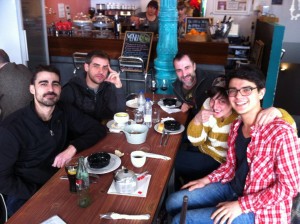We’ve all been taught the importance of putting our research in context. For me, when I took SPA 230 — Contemporary Spain in Context — this “context” took the form of a fully funded Spring Break trip to Madrid and Barcelona, during which each student was required to perform field research on a topic of choice.
When I first set foot in Spain, I had a two questions in mind: How has theater in Spain been able to survive the nation’s economic crisis? Why, in times of crisis, is theater important?
Studying the theater of the Spanish economic crisis, I saw multiple shows and interviewed actors, directors, founders of theater companies, and other theater professionals. While I started the research process with the above questions firmly constructed, I found that my most exciting, surprising discoveries came when my fieldwork forced me to shift my focus and expand to incorporate the unforeseen.

I had been told to not make assumptions and instead let research catch me off-guard. Guided by these principles, I asked questions about everything, even when I already thought I knew the answer. This openness led me to a number of compelling paradoxes: the crisis as a source of sadness and humor, stress and immense creativity, death and rebirth.
For instance — the economic crisis has done great damage to the theater sector. Many alternative theater companies have closed due to economic stresses. To make ends meet, actors have had to work several plays at the same time. Adding insult to injury, in 2012, the government increased the tax on cultural events from 8% to 21% — a message to theaters that culture is merely a luxury.
Despite these struggles, my interviewees surprised me by almost universally agreeing that the crisis is a source of regenerated creativity. As frustrated actors have begun opening their own companies, various small theater companies have begun to pop up all around Spain, putting on small-scale plays with few props, minimalistic sets, and no more than four actors. My interviewees said they were creating the most innovative and exciting theater of their lives.
This was a perspective I had not previously considered, and I believe it added nuance to my work. For me, this is the purpose of working in the field: the opportunity to talk to people and see my academic topic take life. If the goal of research is to add a new voice to a scholarly discussion, before we can make our voices heard, we must venture into the unknown.
— Dylan Blau Edelstein, Humanities Correspondent

